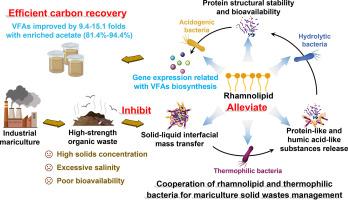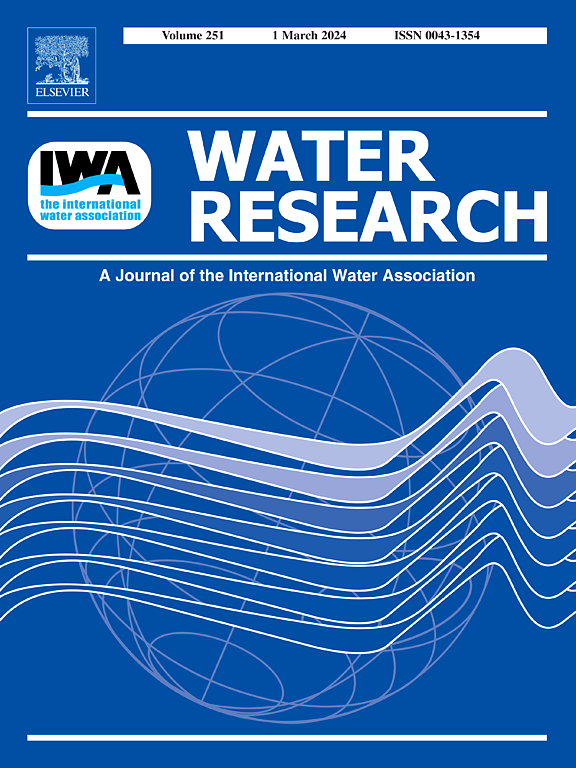Cooperation of rhamnolipid and thermophilic bacteria modifies proteinic structure, microbial community, and metabolic traits for efficient solubilization and acidogenesis of mariculture solid wastes
IF 11.4
1区 环境科学与生态学
Q1 ENGINEERING, ENVIRONMENTAL
引用次数: 0
Abstract
Anaerobic fermentation combined with thermophilic bacteria (TB) pretreatment is a promising method to realize effective waste management and carbon resource recovery. However, undesirable properties of high-strength mariculture solid wastes (MSW) such as high solids concentration, excessive salinity and poor bioavailability limited the overall solubilization and acidogenic efficiency. This study innovatively introduced rhamnolipid (RL) to alleviate this adverse effect, and unveiled its cooperation with TB on enhancing organic matter dissolution and volatile fatty acids (VFAs) production. The results showed that VFAs yield from pretreated MSW was improved by 9.4-15.1 folds with enriched acetate (81.4%-94.4%) in the TB+RL groups. The co-pretreatment of RL and TB disintegrated substrate structure for efficient release of electron shuttles and biodegradable organics. This was because introducing RL reconstructed solid-liquid interfacial charge and molecular arrangement, improved thermophilic enzyme activity, and reduced apoptosis and necrosis cells of TB. Substrate bioavailability was further improved with proteinic structure shifted from α-helix and β-sheet to random coil and aggregated strands, and amide II and carboxyl groups interacted with RL molecules. These changes induced the selective enrichment of hydrolytic and acidogenic bacteria, and the upregulated expression of encoding genes responsible for transmembrane transport, protein hydrolysis, carbohydrate metabolism and acetate biosynthesis. This study provides a new strategy to overcome the bottlenecks of acidogenesis from high-strengthen organic wastes and deciphers the underlying mechanism.


鼠李糖脂与嗜热菌的合作改变了蛋白质结构、微生物群落和代谢特征,从而实现了海产养殖固体废物的高效溶解和酸化
厌氧发酵结合嗜热菌(TB)预处理是实现有效废物管理和碳资源回收的一种可行方法。然而,高强度海产养殖固体废物(MSW)的不良特性,如固体浓度高、盐度过高和生物利用率低等,限制了其整体增溶和产酸效率。本研究创新性地引入鼠李糖脂(RL)来缓解这一不利影响,并揭示了鼠李糖脂与 TB 在提高有机物溶解和挥发性脂肪酸(VFAs)产量方面的合作。结果表明,在 TB+RL 组中,经预处理的 MSW 的挥发性脂肪酸产量提高了 9.4-15.1 倍,富含醋酸盐(81.4%-94.4%)。RL 和 TB 的联合预处理可以分解基质结构,从而有效释放电子梭子和可生物降解的有机物。这是因为引入 RL 重建了固液界面电荷和分子排列,提高了嗜热酶的活性,减少了 TB 细胞的凋亡和坏死。随着蛋白质结构从 α 螺旋和 β 片转变为无规线圈和聚合链,以及酰胺 II 和羧基与 RL 分子的相互作用,底物的生物利用率进一步提高。这些变化诱导了水解菌和产酸菌的选择性富集,以及跨膜转运、蛋白质水解、碳水化合物代谢和醋酸生物合成等编码基因的表达上调。这项研究为克服高强度有机废物产酸的瓶颈问题提供了一种新策略,并揭示了其内在机理。
本文章由计算机程序翻译,如有差异,请以英文原文为准。
求助全文
约1分钟内获得全文
求助全文
来源期刊

Water Research
环境科学-工程:环境
CiteScore
20.80
自引率
9.40%
发文量
1307
审稿时长
38 days
期刊介绍:
Water Research, along with its open access companion journal Water Research X, serves as a platform for publishing original research papers covering various aspects of the science and technology related to the anthropogenic water cycle, water quality, and its management worldwide. The audience targeted by the journal comprises biologists, chemical engineers, chemists, civil engineers, environmental engineers, limnologists, and microbiologists. The scope of the journal include:
•Treatment processes for water and wastewaters (municipal, agricultural, industrial, and on-site treatment), including resource recovery and residuals management;
•Urban hydrology including sewer systems, stormwater management, and green infrastructure;
•Drinking water treatment and distribution;
•Potable and non-potable water reuse;
•Sanitation, public health, and risk assessment;
•Anaerobic digestion, solid and hazardous waste management, including source characterization and the effects and control of leachates and gaseous emissions;
•Contaminants (chemical, microbial, anthropogenic particles such as nanoparticles or microplastics) and related water quality sensing, monitoring, fate, and assessment;
•Anthropogenic impacts on inland, tidal, coastal and urban waters, focusing on surface and ground waters, and point and non-point sources of pollution;
•Environmental restoration, linked to surface water, groundwater and groundwater remediation;
•Analysis of the interfaces between sediments and water, and between water and atmosphere, focusing specifically on anthropogenic impacts;
•Mathematical modelling, systems analysis, machine learning, and beneficial use of big data related to the anthropogenic water cycle;
•Socio-economic, policy, and regulations studies.
 求助内容:
求助内容: 应助结果提醒方式:
应助结果提醒方式:


